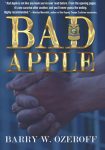

August 21 – 27: “Could an accountant, librarian or nurse be a spy?”
 Must spies be flexible – or career-specific? Or could an accountant, librarian or nurse be a spy? This week ITW Members Martin Roy Hill, J. B. Manas, Connie DiMarco, Diana Deverrel, Arthur Kerns and Barry Ozeroff discuss spies in thrillers. Scroll down to the “comments” section to follow this thrilling discussion!
Must spies be flexible – or career-specific? Or could an accountant, librarian or nurse be a spy? This week ITW Members Martin Roy Hill, J. B. Manas, Connie DiMarco, Diana Deverrel, Arthur Kerns and Barry Ozeroff discuss spies in thrillers. Scroll down to the “comments” section to follow this thrilling discussion!
~~~~~
 Barry W. Ozeroff retired in 2014 after a 28-year career as a police officer, both in La Mesa, CA and Gresham, OR. During his police career, Barry spent 4 years as a school resource officer, 6 years as a traffic motorcycle officer and member of the Vehicular Crimes Team, 5 years as a SWAT sniper, and 12 years as a hostage negotiator. Barry, who was also a field training officer and public information officer, is the recipient of numerous citizen and supervisor commendations, the Oregon Peace Officer’s Lifesaving Award, and the Gresham Police Department Medal of Valor. Bad Apple is Barry’s 4th novel, following Sniper Shot, Return Fire, and The Dying of Mortimer Post. The sequel to Bad Apple, Relative Justice, is under contract and will be released sometime in 2018. Barry has 5 children and 4 grandchildren, and lives with his wife in the Pacific Northwest.
Barry W. Ozeroff retired in 2014 after a 28-year career as a police officer, both in La Mesa, CA and Gresham, OR. During his police career, Barry spent 4 years as a school resource officer, 6 years as a traffic motorcycle officer and member of the Vehicular Crimes Team, 5 years as a SWAT sniper, and 12 years as a hostage negotiator. Barry, who was also a field training officer and public information officer, is the recipient of numerous citizen and supervisor commendations, the Oregon Peace Officer’s Lifesaving Award, and the Gresham Police Department Medal of Valor. Bad Apple is Barry’s 4th novel, following Sniper Shot, Return Fire, and The Dying of Mortimer Post. The sequel to Bad Apple, Relative Justice, is under contract and will be released sometime in 2018. Barry has 5 children and 4 grandchildren, and lives with his wife in the Pacific Northwest.
 Martin Roy Hill is the author of the military mystery thriller The Killing Depths, the mystery thriller Empty Places, the award-winning DUTY: Suspense and Mystery Stories from the Cold War and Beyond, a collection of new and previously published short stories and EDEN: A Sci-Fi Novella. His latest mystery thriller, The Last Refuge, was published in March 2016.
Martin Roy Hill is the author of the military mystery thriller The Killing Depths, the mystery thriller Empty Places, the award-winning DUTY: Suspense and Mystery Stories from the Cold War and Beyond, a collection of new and previously published short stories and EDEN: A Sci-Fi Novella. His latest mystery thriller, The Last Refuge, was published in March 2016.
 J. B. Manas is a Philadelphia-based author of fiction and nonfiction. He is the author of the new sci-fi thriller, ATTICUS, and co-author of The Kronos Interference, named to the “Best of 2012” by Kirkus Reviews, which gave the book a starred review, calling it “impressively original” and “[a] tour de force.” His nonfiction books (written as Jerry Manas) on leadership lessons from history, science, and the arts have been translated into eight languages and course-adopted in universities worldwide.
J. B. Manas is a Philadelphia-based author of fiction and nonfiction. He is the author of the new sci-fi thriller, ATTICUS, and co-author of The Kronos Interference, named to the “Best of 2012” by Kirkus Reviews, which gave the book a starred review, calling it “impressively original” and “[a] tour de force.” His nonfiction books (written as Jerry Manas) on leadership lessons from history, science, and the arts have been translated into eight languages and course-adopted in universities worldwide.
 Connie di Marco is the author of the Zodiac Mysteries from Midnight Ink featuring San Francisco astrologer Julia Bonatti, who never thought murder would be part of her practice. All Signs Point to Murder, the second in the series, will be released on August 8, 2017. Writing as Connie Archer, she’s the national bestselling author of the Soup Lover’s mystery series from Berkley Prime Crime. You can find her excerpts and recipes in both The Cozy Cookbook and The Mystery Writers of America Cookbook. She is a member of International Thriller Writers, Mystery Writers of America and Sisters in Crime.
Connie di Marco is the author of the Zodiac Mysteries from Midnight Ink featuring San Francisco astrologer Julia Bonatti, who never thought murder would be part of her practice. All Signs Point to Murder, the second in the series, will be released on August 8, 2017. Writing as Connie Archer, she’s the national bestselling author of the Soup Lover’s mystery series from Berkley Prime Crime. You can find her excerpts and recipes in both The Cozy Cookbook and The Mystery Writers of America Cookbook. She is a member of International Thriller Writers, Mystery Writers of America and Sisters in Crime.
 In March 2013 Diversion Books Inc. released the acclaimed espionage thriller, The Riviera Contract followed by the sequel, The African Contract. The Yemen Contract was released in June 2016. Arthur Kerns joined the FBI with a career in counterintelligence and counterterrorism. On retirement, he became a consultant with a number of US agencies, including the Department of State. His lengthy assignments took him to over 65 countries.
In March 2013 Diversion Books Inc. released the acclaimed espionage thriller, The Riviera Contract followed by the sequel, The African Contract. The Yemen Contract was released in June 2016. Arthur Kerns joined the FBI with a career in counterintelligence and counterterrorism. On retirement, he became a consultant with a number of US agencies, including the Department of State. His lengthy assignments took him to over 65 countries.
 Diana Deverell was born in Oregon when it was not a trendy place. She fled at age eighteen and earned her living as a long-haul trucker, beef farmer, youth worker, beer taster, and hot/cold war diplomat. Those adventures took place in 48 states, two Canadian provinces, El Salvador, and Poland. After she gathered enough novel material, she moved to Denmark to write full time. She is best known for her legal thrillers, which are set in Spokane, and her spy thrillers, which are not. Diana lives in the Danish countryside with her husband, Mogens Pedersen. She’s also written and published many short stories. “Con Artist in Copenhagen” is the newest.
Diana Deverell was born in Oregon when it was not a trendy place. She fled at age eighteen and earned her living as a long-haul trucker, beef farmer, youth worker, beer taster, and hot/cold war diplomat. Those adventures took place in 48 states, two Canadian provinces, El Salvador, and Poland. After she gathered enough novel material, she moved to Denmark to write full time. She is best known for her legal thrillers, which are set in Spokane, and her spy thrillers, which are not. Diana lives in the Danish countryside with her husband, Mogens Pedersen. She’s also written and published many short stories. “Con Artist in Copenhagen” is the newest.
- LAST GIRL MISSING with K.L. Murphy - July 25, 2024
- CHILD OF DUST with Yigal Zur - July 25, 2024
- THE RAVENWOOD CONSPIRACY with Michael Siverling - July 19, 2024
